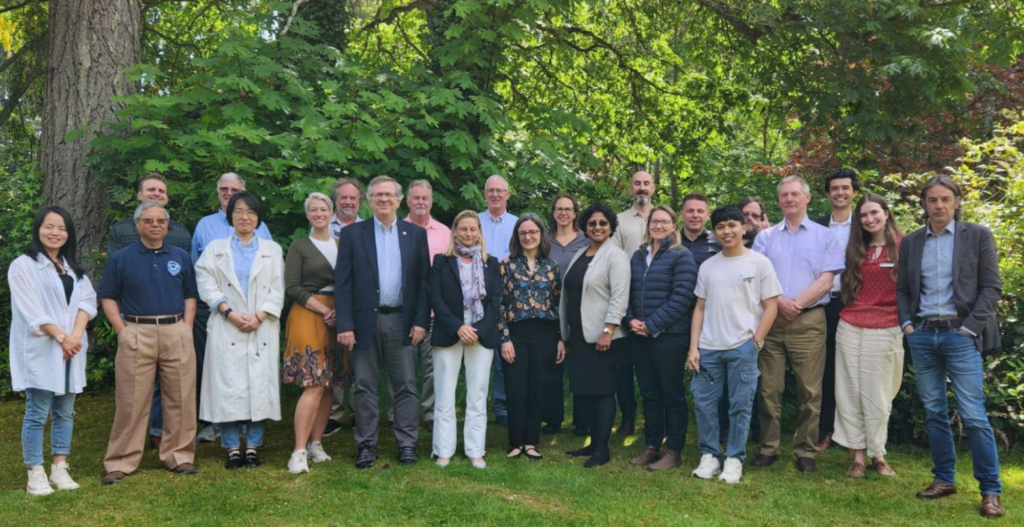The Fifteenth Observations Coordination Group meeting (OCG-15) was a strategically important session that set the course for the global ocean observing networks and OceanOPS, with regard to working together towards an integrated, mature and fit for purpose ocean observing system that is understood as a critical global infrastructure for society, environment and the economy.

The Observations Coordination Group (OCG) is a key component of the IOC-UNESCO led Global Ocean Observing System, strengthening the implementation of a global observing system through supporting cross-network coordination and advancing network maturity to deliver interoperable and accessible ocean observations.
On 13-17 May, 2024, the OCG members gathered in Victoria, Canada, and virtually, for their fifteenth meeting. GOOS extends its gratitude to Ocean Networks Canada for hosting the meeting, and contributing towards key topics. A summary of the key outcomes of OCG-15 is provided below.
OCG Network attributes
The GOOS OCG observing network attributes, which define the key qualifications expected of OCG-approved ocean observing networks, have been an important aspirational benchmark or roadmap for the ‘emerging’ networks and helped other networks towards maturity. The Ocean Observing System Report Card regularly notes networks’ achievement against key attributes in data and best practices.
OCG-15 decided to strengthen this framework by agreeing to work on defining pilot and mature network status, in line with the attributes and concepts outlined in the Framework for Ocean Observing (FOO). Additionally, OCG decided to work on the development of an observing network health index to provide a snapshot of the ‘health’ of each network.
New emerging OCG Networks
The OCG decided to adopt the Fishing Vessel Observing Network (FVON), Science Monitoring And Reliable Telecommunications (SMART) Subsea Cables and Surface Ocean CO2 Reference Network (SOCONET) as new ‘emerging’ networks at OCG-15.
This advances global ocean observing capacity, as each of these emerging networks will deliver unique observing benefits within an integrated system. This designation means that the networks commit to working with OCG and the other observing networks towards achieving a mature and integrated observing system. All three emerging networks use existing ocean infrastructure – fishing vessels, submarine telecommunications cables and existing observing platforms – and so additionally represent efficient use of current marine assets.
Restructuring OceanOPS
The GOOS operational center OceanOPS provided an update on its restructuring and intentions to better position itself to better support the networks, GOOS and the World Meteorological Organization (WMO) into the future, which is increasingly digital and federated.
OCG made a key decision towards an improved management practice whereby OceanOPS will work with the ocean observing networks towards defining tiers of services and implementing service level agreements.
Observing priorities
The OCG also considered observing priorities from the GOOS Expert Panels. A clear priority noted by the Biogeochemistry Panel is to consider the viability of expanding oxygen observations across existing networks, and near-term actions were discussed. The BioEco Panel prioritized working with specific existing networks in expanding their scope, e.g. Bio GO-SHIP and AniBOS.
Cross-network data implementation
The OCG cross-network Data Implementation Strategy, released earlier in 2024, catalyzed a discussion on the individual networks and how to develop and leverage their implementation pathways. In addition, the launch of WMO’s WIS2.0 system (replacing the GTS in 2027) is underway and could help the OCG advance the cross network data implementation strategy.
A decision was taken to set up a cross-network OCG Data Task Team to work on the elements raised in the technical discussions.
What’s next?
The next OCG meeting will take place in May 2025. In this intersessional period, the OCG will be seeking a new Chair. GOOS would like to thank the current OCG Chair David Legler for 10 years of dedicated service and the great outcomes that were achieved during this period of time. Major initiatives on implementing the OCG Data Strategy, and improving the OCG observing network maturity model will also be a focus for the OCG in the coming year.
The OCG Team is already moving forward with the key actions identified at OCG-15 – see the summary of the report for more details. “We invite the ocean community to engage and support the efforts of the OCG and its growing suite of observing networks,” says David Legler.
The full report with key decisions from OCG-15 can be accessed here.
